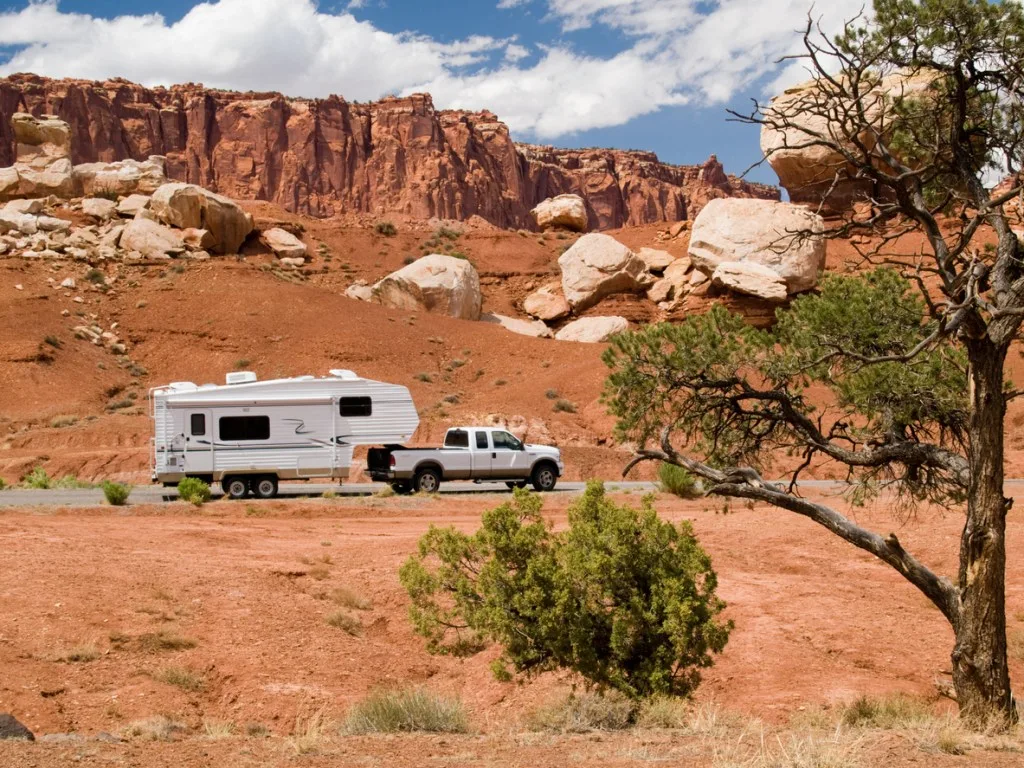5 Reasons to Avoid RV Loans
No matter how you plan to use an RV, you may experience a bit of sticker shock while shopping. RVs, especially new models, aren’t cheap and may require taking out an RV loan unless you’re paying cash.
Debt can be overwhelming and restricting, so let’s look at five reasons we think you should avoid RV loans.
What Is an RV Loan?
An RV loan is when you borrow from a bank or financial institution to finance an RV. While you own the RV, the financial institution holds the title. Upon paying off an RV loan, the title will be transferred into the buyer’s name and sent to them.
RVs can be incredibly expensive, so you could be paying off that loan for five to 15 years, but 20 year RV loans aren’t uncommon. Extending a loan’s payoff period provides a cheaper monthly payment but adds interest. Be sure you understand what you agree to before signing your name on the dotted line.

5 Reasons to Avoid RV Loans
You may feel like running down to your local RV dealer after seeing pictures and videos of RVers enjoying the RV lifestyle. However, let’s look at a handful of reasons we think you should avoid RV loans.
1. Higher Interest Rates are Typical with RV Loans
The terms of a loan vary based on several factors, but RV loans often have higher interest rates than homes and vehicles. Your credit score, income level, and debt-to-income ratio are factors a bank considers when offering a loan.
When you combine higher interest rates with extended payoff periods, the result is the borrower paying back considerably more than they initially borrowed. Remember that you must repay every penny you borrow — with interest.
Pro Tip: Interest rates can vary if you’re busy new vs used. Here’s a look into the best option.

2. Have to Buy Newer RV
Many financial institutions are reluctant to finance older RVs. The older the RV, the more difficult it will be to find financing for it. Typically, RVs older than 10-15 years are almost impossible to get financed. Of course, a bank may consider it if you have a large down payment or an appealing credit profile.
Because financing an older RV can be difficult, you may need to purchase a newer RV. Buying a newer RV not only means paying a premium price but also absorbing the depreciation of the unit.
3. The Chances of Becoming Upside Down in the RV Loan Are High
A new RV loses a considerable amount of value when you leave the lot. An RV can depreciate by 20% in the first year. This depreciation often means that unless you make a large down payment, you’re going to owe more than your RV is worth.
This “upside-down” loan can become a major problem when you’re looking to upgrade or sell your RV. If you can’t sell your RV for what you owe on it, you’ll need to write the lender a check for the difference. Negative equity is another reason you should finance as little as possible when financing an RV.
Keep in mind: Here are 5 reasons to avoid RV dealers.
4. It’s More Difficult to Get RV Financing for RV Loans
Financing an RV is a hoop that can be difficult to jump through. Lenders often see RVs as luxury items and not necessities. It’s not uncommon for individuals with decent credit to have their applications denied.
If you’re looking to finance an RV soon, it’s best to begin paying off consumer debt as much as possible. You want your financial profile to appear as appealing as possible to the lender. The financing department at the dealership will do all they can to help you secure financing but having an appealing financial profile makes their job easier. Having an attractive financial profile also can help you secure a lower interest rate.
5. Often Requires Substantial Down Payment
Don’t be surprised if the lender requires you to put down 5-10%. This down payment may not sound like much, but when you’re financing a $50,000 RV, you’re looking at upwards of $5,000.
Having a down payment helps lower the amount of financing and is a sign to the lender that your finances are healthy. If you’re anticipating financing a loan, it’s a good idea to start saving money in advance or have a plan to cover this upfront cost.

Are RV Loans Worth It?
A majority of people don’t have the cash on hand to purchase an RV outright. Buying an RV is a significant financial decision that you shouldn’t take lightly. Keep in mind some of the hidden costs of RV ownership when considering how much you can afford. If your loan will put a financial strain on you, it’s likely not worth it.
However, making an informed decision within your budget can help your family make a lifetime of priceless memories.
It’s your responsibility to know what you can afford to pay for a loan. Don’t let the finance or sales department at the dealership tell you what you can afford. A loan with a payment you can’t afford can make it difficult to enjoy your RV. What’s your biggest regret when it comes to a loan?
Discover the Best Free Camping Across the USA
To be honest with you, we hate paying for camping. There are so many free campsites in America (with complete privacy).
You should give it a try!
As a matter of fact, these free campsites are yours. Every time you pay federal taxes, you’re contributing to these lands.
Become a FREE CAMPING INSIDER and join the 100,000 campers who love to score the best site!
We’ll send you the 50 Best Free Campsites in the USA (one per state). Access the list by submitting your email below:
How about other ways of paying for RVs, such as a Home Equity Line of Credit (HELOC), which is secured with the equity in your home? This allows one to pay cash for the RV, then pay back the line of credit based upon whatever terms were used to secure the HELOC. HELOCs are generally favorable rates to automobile loans and could be used for a new or used RV of any age. Note that I am not a financial advisor, do not work for any lender and will not profit off of any loan or purchase transaction you make.